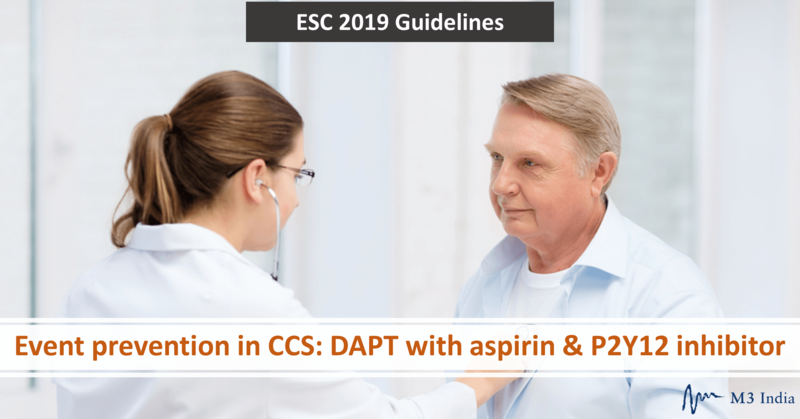2019 ESC Guidelines: Event prevention in chronic coronary syndrome (CCS)- DAPT with aspirin & P2Y12 inhibitor
M3 India Newsdesk Nov 12, 2019
Platelet activation and aggregation is the main trigger for symptomatic coronary thrombosis. As per the 2019 ESC guideline, dual antiplatelet therapy (DAPT) with aspirin and an oral P2Y12 inhibitor should be the mainstay of antithrombotic therapy after myocardial infarction and/or percutaneous coronary intervention.

Platelet activation and aggregation is the main trigger for symptomatic coronary thrombosis; antiplatelet drugs provide a favourable balance between the prevention of ischaemic events and increased risk of bleeding in chronic coronary syndrome (CCS).
Dual antiplatelet therapy (DAPT) with aspirin and an oral P2Y12 inhibitor should be the mainstay of antithrombotic therapy after myocardial infarction (MI) and/or percutaneous coronary intervention (PCI).
Low-dose aspirin
As high-dose aspirin is associated with gastrointestinal side effects, current evidence supports a daily dose of 75 to 100 mg of aspirin for the prevention of ischaemic events in CAD patients with or without a history of MI. Platelet function testing is not necessary to monitor individual response, as cyclooxygenase-1 inhibition by aspirin is consistent and predictable in adherent patients.
Non-selective non-steroidal anti-inflammatory drugs, such as ibuprofen, are not recommended as an alternative option in patients with aspirin intolerance due to cardiovascular risk.
Oral P2Y12 inhibitors
Platelet P2Y12 receptor play a vital role in platelet activation and the amplification of arterial thrombus formation. Clopidogrel and prasugrel are P2Y12 inhibitors that irreversibly block P2Y12 via active metabolites, while, ticagrelor is a reversibly-binding P2Y12 inhibitor that does not require metabolic activation. The use of a radial artery approach and clinical experience has allowed consideration of clopidogrel pre-treatment in patients who have a high chance of requiring PCI.
- In the CAPRIE (Clopidogrel vs. Aspirin in Patients at Risk of Ischaemic Events) trial clopidogrel demonstrated an overall slight benefit compared with aspirin in preventing cardiovascular events in patients with previous MI, previous stroke, or PAD. However, clopidogrel is limited by variable pharmacodynamic effects, which may lead to a lack of efficacy in some patients.
- Prasugrel has a more rapid and greater antiplatelet effect compared with clopidogrel. Prasugrel also has greater efficacy than clopidogrel in aspirin-treated patients with ACS undergoing PCI.
- Ticagrelor has high level of P2Y12 inhibition during maintenance therapy in adherent patients, and also has more rapid onset, as well as more rapid and predictable offset of action compared with clopidogrel. Ticagrelor as monotherapy appears to have similar efficacy and safety to aspirin monotherapy in patients with previous PCI.
Duration of dual antiplatelet therapy
- After PCI for stable angina, 6 months of DAPT can help achieve the optimum balance of efficacy and safety.
- Due to an increased risk of stent thrombosis, premature discontinuation of a P2Y12 inhibitor is discouraged. However, a shorter duration of DAPT may be considered in those presenting with a high risk of life-threatening bleeding; this is in view of the very low risk of stent thrombosis after 1 to 3 months.
Anticoagulant drugs in atrial fibrillation
Anticoagulants are superior over aspirin monotherapy or clopidogrel-based DAPT for stroke prevention, and are therefore recommended in patients with AF and CCS. A non-vitamin K antagonist oral anticoagulant (NOAC) such as apixaban, dabigatran, edoxaban, or rivaroxaban is recommended in preference to a vitamin K antagonist (VKA).
Proton pump inhibitors
Proton pump inhibitors reduce the risk of gastrointestinal bleeding in patients treated with antiplatelet drugs and may be useful adjunctive treatment for improving safety. Co-administration of omeprazole or esomeprazole with clopidogrel is usually not recommended as they may reduce the pharmacodynamic response to clopidogrel.
Cardiac surgery and antithrombotic therapy
In patients with chronic coronary syndrome (CCS) undergoing elective cardiac surgery, it is recommended to continue aspirin therapy; the use of other antithrombotic drugs should be stopped at intervals according to their duration of action and indication. Reloading of aspirin after coronary artery bypass grafting (CABG) surgery is associated with improvement in graft patency.
Non-cardiac surgery and antithrombotic therapy
Non-cardiac surgery is associated with an increased risk of MI. After PCI, it is recommended to postpone elective surgery until the recommended course of DAPT has been completed. In most non-cardiac surgeries, aspirin should be continued as the benefit outweighs the bleeding risk, but it should be avoided in procedures with extremely high bleeding risk.
Statins and other lipid-lowering drugs
Statin treatment must be considered in patients with established coronary artery disease (CAD) irrespective of low-density lipoprotein cholesterol (LDL-C) levels. The goal of treatment should be
- To lower LDL-C to <1.8 mmol/L (<70 mg/dl) OR
- At least to reduce it by 50% if the baseline LDL-C level is 1.8–3.5 mmol/L (70 to 135 mg/dl).
When the suggested LDL-C levels cannot be maintained, ezetimibe can be added to decrease cholesterol and cardiovascular events in post-acute coronary syndrome (ACS) patients.
Renin−angiotensin−aldosterone system blockers
Angiotensin-converting enzyme (ACE) inhibitors or angiotensin receptor blockers (ARBs) are recommended for the treatment of CCS with coexisting hypertension, left ventricular ejection fraction (LVEF) ≤40%, diabetes, or chronic kidney disease (CKD).
In patients with HF or heart failure (LVEF ≤35%) who are unresponsive to ACE inhibitor, a beta-blocker, and a mineralocorticoid receptor antagonist (MRA), sacubitril/valsartan is recommended as a replacement for an ACE inhibitor to reduce the risk of HF hospitalization and death.
Aldosterone blockade with spironolactone or eplerenone is recommended for use in post-MI patients who are already receiving therapeutic doses of an ACE inhibitor and a beta-blocker, have an LVEF ≤35%, and have either diabetes or HF. Care should be taken when using MRAs in patients with impaired renal function and in those with serum potassium levels ≥5.0 mmol/L.
-
Exclusive Write-ups & Webinars by KOLs
-
Daily Quiz by specialty
-
Paid Market Research Surveys
-
Case discussions, News & Journals' summaries